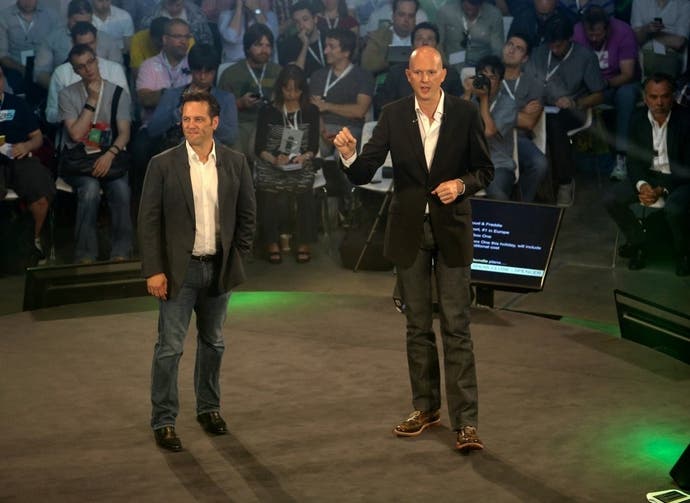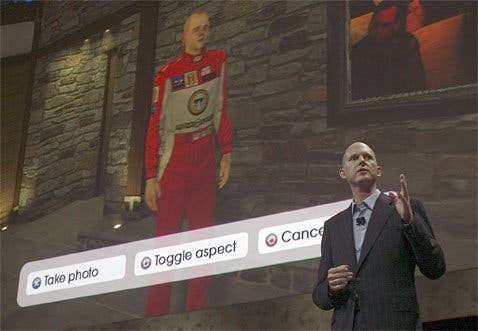What's Phil Harrison up to these days?
On PS4 Pro, Xbox One X, E3 press conferences and virtual reality.
Phil Harrison sees things from a special perspective, not because he's as tall as an NBA basketball player, but because he's had high-up jobs at both PlayStation and Xbox. He was with Sony for 15 years, fronted conferences, fronted PlayStation for goodness sake - he's a huge part of PlayStation history. He was at Microsoft for a blink of an eye by comparison - only three years - but in no less of a key role: leader of Xbox in Europe. He's worked on both sides of the fence.
But Microsoft was two years ago: these days Harrison invests. He makes investments like the one yesterday: London virtual reality and augmented reality start-up Dream Reality Interactive, run by Harrison's old Sony SingStar colleague Dave Ranyard. In other words, Harrison uses all his knowledge gained over the years to make smart bets on the future. You could say he puts his money where his mouth is.
I caught up with him at the ongoing Gamelab conference in Barcelona to see what he thought about how his old employers Microsoft and Sony are doing, and more.
PS4 Pro and Xbox One X
Mid-generation refreshes - half-step improvements in hardware - are a new thing this console generation. In Harrison's day, particularly at PlayStation, 'smaller, slimmer, cheaper' was the mantra.

"It's a new approach to the business model," Harrison said. "Whereas previously you keep the platform the same and dramatically reduce the price to get to new audiences, they're keeping the price the same or slightly higher but increasing the performance.
"It's unclear how that will play out, whether it's going to double the install-base like it would have done in PlayStation 2 era, dropping from 399 to 199 to 99. I'm not sure it's going to have the same dramatic growth on the market as we've seen in the past."
A lack of Xbox exclusives
Harrison was president of Sony Worldwide Studios when he left in 2008 - the job Shawn Layden now holds. Those Worldwide Studios are Sony's network of first-party studios making exclusive PlayStation games. Harrison helped lay the foundations for European PlayStation exclusives such as LittleBigPlanet, and tried to do similar with Microsoft Studios for Xbox. What he brought to the table were exactly the sort of glitzy platform exclusives in short supply at this year's E3.
But we're seeing fewer and fewer first-party exclusive games from Microsoft. Why?
"Both Microsoft and Sony have the same challenge," Harrison said, "which is the cost of development to compete has gone up so dramatically you really have to be launching on multiple platforms to have any chance of making money.
"The traditional first-party business model of only making a game exclusively for your own device: the economics are really tough. I'm not saying they don't work but they don't work in as many cases as they used to."
The E3 press conferences
Phil Harrison is no stranger to the E3 press conference stage - he's been on it enough times. I wondered what he thought about this year's bunch of performances and what it was like working on them from the inside.

"What you see on stage at those press conferences is the result of months and months of preparation and editorial process," he said. "You want to set a certain level of expectation and excitement for your platform; you want to show the best things you've got - but you don't want to blow all of your fireworks in one go. It's an incredibly hard thing to get right.
"You have all these different stakeholders that you have to keep happy. You've got your own aspirations as a brand and as a company: you want to do the best job you can for your products. You then have the hardcore fans you invite who are incredibly important and are incredibly welcome, and you want them to be there. But are you only presenting to them or are you presenting to the thousand-or-so industry people in the room? Or are you presenting to the few million people streaming? It's so hard to thread the needle through all of those."
I asked whether the notion of 'winning' an E3 press conference battle was ever a thing felt internally at Sony and Microsoft.
"No of course not," he said. "I always used to laugh about this because I completely understand why the media go through that 'who won?' routine - I get that and it's quite interesting to read - but could you tell me, looking back, who won E3 2009?"
I thought for a bit and I couldn't.
"No of course not," he said. "Does it matter? No of course not. It's a way of - no harm in it - writing another interesting story about E3 that doesn't really matter in the long term."

He laughed when I asked how close to the wire things got before conferences. "Oh Jesus!" he said. "Very close, very close." But he said there weren't any last minute changes made in reaction to what opposing platforms holders might have just said or done.
"No," he said, "because you are so well into your rehearsal programming, your scripting, you can't make fundamental wholesale changes. You get feedback, you get a little bit of insight from what's going on, but it's more useful in the follow-up interviews with media. It's not something you can really react to on stage."
PlayStation VR or Hololens?
Harrison has a big interest in virtual reality and augmented reality - he's investing in it. He's thought a lot about it and where he believes it will go. Was PlayStation VR the right horse for Sony to back, then?
"Sony's blazing a trail in VR," he said. "When you look at the combined power of Sony, Microsoft, Facebook, Google, Samsung, Apple in AR: you've got a ton of compute and financial power being brought to bear on VR, and Sony should be applauded for being a pioneer in this space."
But...
"I don't believe that any of the devices that are on the market today are going to be the winners 10 years from now," he added, "meaning, I don't think any of the devices we see today are going to have the legs to last a 10-year generation.
"I was having a conversation with Hilmar [Veigar Pétursson] from CCP [the CEO] about this exact issue last night and he came up with a brilliant analogy. He said, 'VR is like scuba diving in fresh air,' because you're wearing all this stuff and it's a really uncomfortable experience."

Not to mention the set-up, the room space, the faffing around.
"All of the devices need to go through a massive change," he carried on, "and Phil Spencer is right when he says, 'When you've got loads of wires sticking out of your head, it's not going to be a mass market adoption.'"
There will be a core audience who continues to be "blown away" by VR as it is, but for it really to take hold, the hardware needs improving.
"There's a number of things that have to happen all at once," he said. "There is the natural progression of Moore's law in making compute performance faster or use less energy. In wearable computing, thermal is the most important problem to solve. If you've got a tower PC kicking out huge amounts of heat, that's not a problem. But if you strap that equivalent computer power to your head then that is a problem. Weight is another issue. Usability. Those are industrial design form-factor challenges."
Most of the technology in the headsets today is "relatively standard" off the shelf stuff, Harrison said. The next wave will apparently have bespoke components - bespoke GPUs and CPUs.
But VR headsets, Harrison believes, can only spread so far.
"It's likely - and this is unproven, nobody knows for sure - there will be a mass-market reluctance to wear a completely immersive device," he said. "Some people just won't like the idea of blocking out the outside world, whereas I believe more of the world is going to be interested in a mixed reality: an augmented reality where you can still see, you can still hear - you can still interact with real people but it's augmented with additional data. That is the end goal."
Microsoft's bet with Hololens, which looked ever so exciting recently showcasing the first level of Super Mario Bros. but overlayed on New York, may be a good one then.
"They have made some strong moves in creating an ecosystem for VR through the Windows platform, and there will be hardware providers in Windows' ecosystem who bring VR headsets to the market," he said, "but the bet seems to be around Hololens for now, and that's a pretty impressive piece of technology. The price point [$3000 or $5000 for crying out loud!] means they are positioning it as an enterprise solution today, but over time you could imagine that becoming cheaper, smaller and more mass market."

The Dream Reality Interactive company he invested in "is making VR/AR experiences including games". A press release mentioned several projects including something called Hold the World, a collaboration with Sky that features a hologram of David Attenborough, the legend. "I think the first products will be out this year," said Harrison.
Some food for thought from the very big man himself. Did you know he broke his shoulder a year ago while biking with his son? "I made a bit of a mess of it but I've got a piece of metal now," he said, pointing to it. I wonder what he will invest in next.

